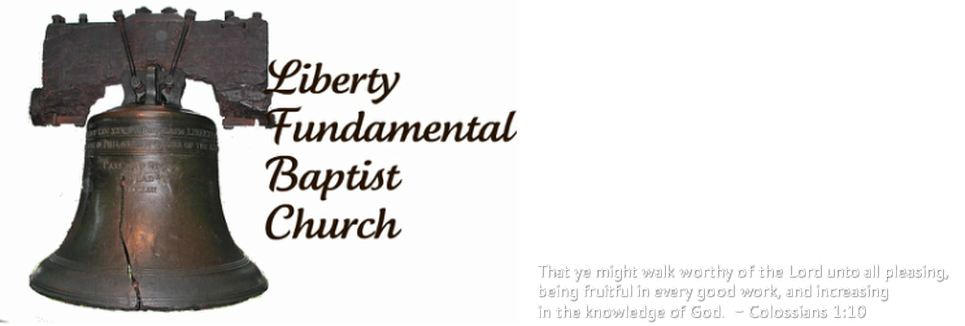THE SCRIPTURES
We believe that the Holy Bible as originally written was verbally and plenarily inspired (directly God-breathed) and the product of Spirit-directed men; and therefore, is the truth without any mixture of error. Further, we believe that God’s Word is infallible (without any error whatsoever) and inerrant (incapable of error) in its original transmission from God to man, and thus it is the sole standard by which all human conduct, creeds and opinions shall be governed and tried.
The sixty-six books of the Old and New Testament are the complete and divine revelation of God to Man. The Scriptures shall be interpreted according to their normal grammatical-historical meaning, and all issues of interpretation and meaning shall be determined by the pastor and the Deacon board.
The Bible is absolutely true in everything it affirms, whether it be doctrine, history, science, geography, prophecy or Christian living. Because the original autographs/manuscripts do not exist today, accurate translations of the originals can be said to be inspired only in a derivative sense, in as much as they reflect the original.
God has providentially preserved His Word through the totality of the existing Hebrew, Aramaic and Greek manuscripts.
We further believe that Scripture is to be approached from a Dispensational rather than from a Covenantal perspective, based on the progressive unfolding of the revelation of God, in which He worked at different times, in different ways, with different people to execute His plan for the human race. Such an approach recognizes the fundamental distinction between God’s Old Testament people, Israel, and His New Testament people, the Church.
We believe that the Scriptures interpreted in their natural, literal sense reveal seven divinely determined dispensations or rules of life which define man’s responsibilities in successive ages. These dispensations are no ways of salvation, but rather are divinely ordered stewardships by which God directs man according to His purpose. Three of these dispensations—the law, the church, and the kingdom—are the subjects of detailed revelation in Scripture.
In addition, we insist on the literal, historical, grammatical and contextual interpretation of Scripture as the norm for understanding God’s Word. We believe that when consistently applied, such an interpretation will lead to dispensational conclusions.
(Gen. 1:28; I Cor. 9:17; II Cor. 3:9-18; Gal. 3:13-25; Eph. 1:10; 3:2-10; Col. 1:24-25, 27; Rev. 20:2-6)
(II Tim. 2:15; 3:16; II Peter 1:19-21)
We believe that the Holy Bible as originally written was verbally and plenarily inspired (directly God-breathed) and the product of Spirit-directed men; and therefore, is the truth without any mixture of error. Further, we believe that God’s Word is infallible (without any error whatsoever) and inerrant (incapable of error) in its original transmission from God to man, and thus it is the sole standard by which all human conduct, creeds and opinions shall be governed and tried.
The sixty-six books of the Old and New Testament are the complete and divine revelation of God to Man. The Scriptures shall be interpreted according to their normal grammatical-historical meaning, and all issues of interpretation and meaning shall be determined by the pastor and the Deacon board.
The Bible is absolutely true in everything it affirms, whether it be doctrine, history, science, geography, prophecy or Christian living. Because the original autographs/manuscripts do not exist today, accurate translations of the originals can be said to be inspired only in a derivative sense, in as much as they reflect the original.
God has providentially preserved His Word through the totality of the existing Hebrew, Aramaic and Greek manuscripts.
We further believe that Scripture is to be approached from a Dispensational rather than from a Covenantal perspective, based on the progressive unfolding of the revelation of God, in which He worked at different times, in different ways, with different people to execute His plan for the human race. Such an approach recognizes the fundamental distinction between God’s Old Testament people, Israel, and His New Testament people, the Church.
We believe that the Scriptures interpreted in their natural, literal sense reveal seven divinely determined dispensations or rules of life which define man’s responsibilities in successive ages. These dispensations are no ways of salvation, but rather are divinely ordered stewardships by which God directs man according to His purpose. Three of these dispensations—the law, the church, and the kingdom—are the subjects of detailed revelation in Scripture.
In addition, we insist on the literal, historical, grammatical and contextual interpretation of Scripture as the norm for understanding God’s Word. We believe that when consistently applied, such an interpretation will lead to dispensational conclusions.
(Gen. 1:28; I Cor. 9:17; II Cor. 3:9-18; Gal. 3:13-25; Eph. 1:10; 3:2-10; Col. 1:24-25, 27; Rev. 20:2-6)
(II Tim. 2:15; 3:16; II Peter 1:19-21)
